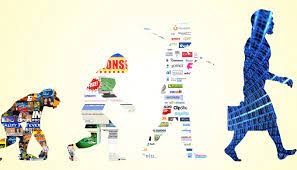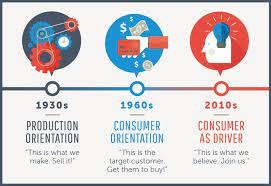The concept of marketing is as old and as complex as the human race itself. However, it was only in the early 1900s that this discipline became a reality. Since the dawn of civilization, cultures have relied on communication to trade and sell products in order to outpace competitors. Since the 1950s, marketing strategy has been driven by a need to better understand the relationship between buyers and sellers.

The Industrial Revolution is the source of many of the marketing strategies we use today. Businessmen had to come up with a better plan for the movement of goods because mass production, transportation, and technology were improving. How can you sell something when your competitor produces the same thing as you? It was at this point that marketing became a profession.
Businesses would need to hire specialists who can study the markets, consumers and their behaviour. They will also need to find ways to remain competitive. This marked a shift in thinking towards the outside and put the customer experience at the forefront. For advice from Marketing Strategy Consultants, visit https://www.reallyhelpfulmarketing.co.uk/specialist-services/marketing-strategy-consultant/
The Industrial Revolution began with a shortage of goods. Businesses could focus on manufacturing because there were no buyers. The market became flooded with competition after this period, and production surpassed demand. Around this time, it became more important to offer something extra to make your product a preferred choice. Due to the increased competition, marketing, sales and brand development were created.

As a result, from the 1950s, marketing became more strategic due to the saturation of the market. Marketing professionals were tasked with advising companies on how to produce products, how they should be distributed and what price ranges would work best. Marketing knowledge became increasingly desirable, and the discipline really took flight.
We see marketing evolve into ideas that focus on building client loyalty and relationships. As it was stated, “the cost to attract a new client is estimated at five times the cost to keep a customer satisfied.” Social media is now a global phenomenon, and marketing can focus on connecting with consumers in real-time. Businesses are now able to connect with consumers and potential clients all day long. How a company engages people is crucial to its success.
Marketing is about adapting and changing to the way consumers think and behave. As a concept it will continue to change as communication methods, production levels, and even society changes. The theory and practice will change as markets expand and new marketing platforms are developed.









